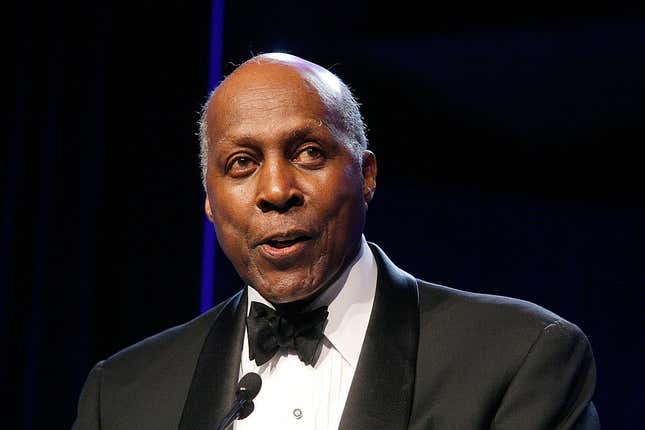
Vernon Jordan, an iconic civil rights leader, presidential adviser and lawyer who held leadership roles at the United Negro College Fund and the National Urban League, and who worked as a Georgia field secretary for the NAACP and director of the Voter Education Project for the Southern Regional Council at the height of the civil rights movement, has died at 85.
Jordan’s daughter, Vickee Jordan Adams, confirmed his passing with a statement to Andrew Ross Sorkin of the New York Times on Tuesday.
“Vernon E. Jordan Jr. passed away peacefully last evening surrounded by loved ones,” she said. “We appreciate all of the outpouring of love and affection.”
Derrick Johnson, President of the NAACP—which, in 2001, awarded Jordan its highest honor, the Spingarn Medal, said in a statement, “Today, the world lost an influential figure in the fight for civil rights and American politics, Vernon Jordan. An icon to the world and a lifelong friend to the NAACP, his contribution to moving our society toward justice is unparalleled.”
“His exemplary life will shine as a guiding light for all that seek truth and justice for all people,” Johnson added.
“The National Urban League would not be where it is today without Vernon Jordan. We have lost more than a leader; we have lost a brother,” said President and CEO of the NUL, Marc H. Morial, in a statement. “Born into an era when Black men were routinely addressed as ‘Boy,’ Vernon’s mother pointedly nicknamed him ‘Man.’ He honored her faith in him with his bravery, his grace, his brilliance and his excellence.”
Jordan was a Georgia native, born on August 15, 1935, in Atlanta. After growing up in a segregated South, he went on to attend Depauw University in Indiana where he was the only Black student in his class. The title of his 2001 memoir, Vernon Can Read!, was inspired by his experiences as an undergraduate, when he worked a summer job for a white banker who was stunned to find the young Jordan reading books in his home library and exclaimed at the discovery to his family over the dinner table.
A passion for civil rights led Jordan to earn his law degree at Howard University, where he graduated in 1960. Just a year later, he worked with lawyers Donald Holloway and the NAACP Legal Defense Fund’s Constance Baker-Motley in a successful suit to desegregate the University of Georgia. Jordan personally escorted one of the plaintiffs in the case, Charlayne Hunter-Gault, onto the UGA campus amidst a mob of 1,000 white people violently protesting her admittance.
Jordan’s career went on to be typified by the pursuit of racial justice for African Americans. He worked as field secretary for the NAACP and headed the Voter Education Project for the Southern Regional Council during the 60s, registering Black people to vote and leading voting campaigns across the region. After serving as director of the United Negro College Fund in the early ’70s, he went on to head the National Urban League for 10 years. Jordan’s work at the Urban League was briefly interrupted in 1980 when he was shot and injured by a white supremacist in an attempted assassination. The shooter was acquitted of the attempt on Jordan’s life but admitted to it decades later.
While recovering from his gunshot injuries, Jordan was visited in the hospital by then-President Jimmy Carter. In 1981, Jordan left the Urban League to go into private law at the Akin Gump firm in Washington, D.C. He remained a nationally respected and influential figure and was a well-known close friend and adviser to former President Bill Clinton, whose 1992 presidential transition committee Jordan chaired. Jordan would also be drawn into the Monica Lewinsky scandal, which led to Clinton’s impeachment. Though Jordan endorsed Hillary Clinton’s bid for the presidency in 2008, he was also a friend of former President Barack Obama.
Jordan continued to believe strongly in the power of the law to secure and defend civil rights in America. “We do not sing ‘We shall endure.’ We sing ‘We shall overcome,’” he wrote for the New Yorker in 2017. “I am of the belief that in order to change a nation you must of course change hearts and minds, but you must also change the laws.”
He is survived by his wife Ann Dibble Jordan, his daughter and several grandchildren.

